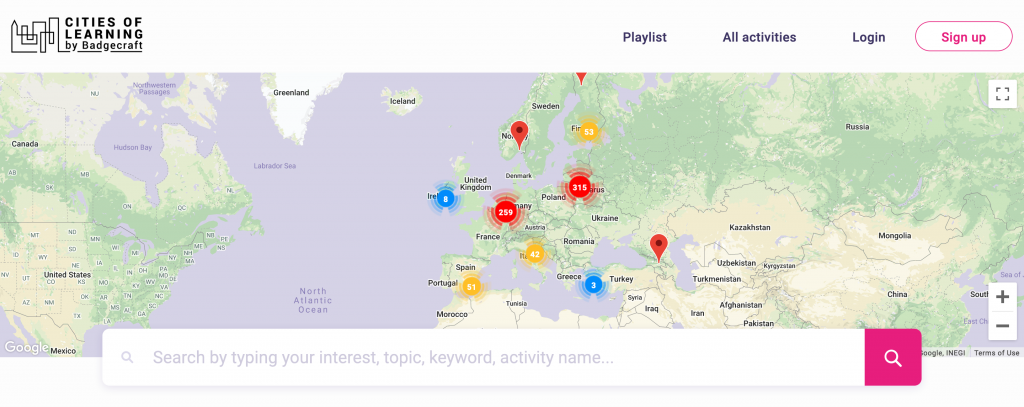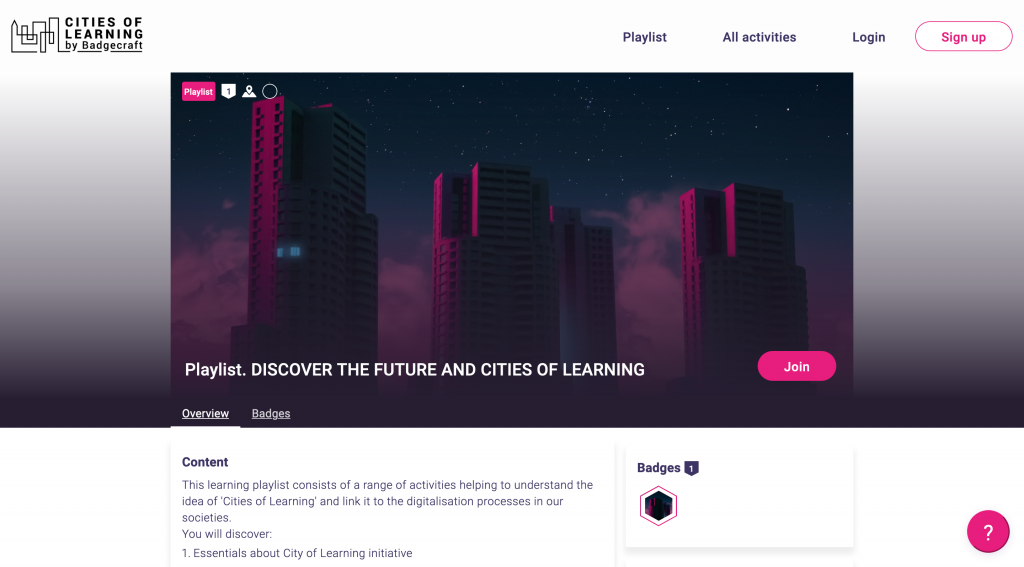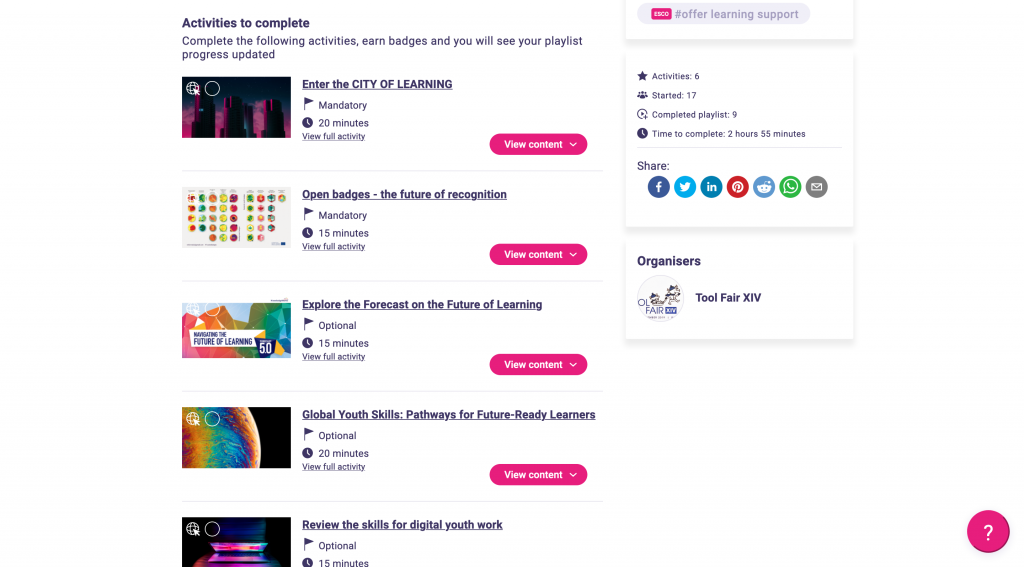Connected Spaces of Learning in Europe
The Erasmus+ Strategic Partnership ‘Connected Spaces of Learning in Europe’ was initially aiming to create a sustainable and youth-oriented participatory solution for European cities and regions to map, deliver and recognise diverse opportunities for young people. In order do build this solution, the following objectives had been identified to implement:
- map and connect spaces of non-formal and informal learning, which enables young people to better “navigate” through learning opportunities, based on needs, interests and passions.
- build online mapping software adapted to the needs of partners’ represented territories and easily scalable.
- develop capacities of local learning providers and build online software for creating learning playlists – a youth-friendly way to present and deliver diverse learning content online and offline with integrated recognition through open badges.
- build a toolkit and documentation for online software, which enables regions, cities or consortiums to create their maps and playlists of learning anywhere.
- engage young people in identifying learning opportunities and shaping the understanding of learning according to their needs, interests and passions.
The following partners participated in implementing ‘Connected Spaces of Learning in Europe’:
- Nectarus and Open Youth Centre “Mes” representing Vilnius municipality, Lithuania
- Breakthrough in Tilburg, The Netherlands
- Cazalla Intercultural and Regional youth council in Lorca, Spain
- GOEUROPE! at Red Cross (applicant) and Internationaler Bund in Saxony- Anhalt region, Germany
- Centraider and Regional administration of Val de Loire region, France
- Badgecraft Ireland
Below you will find described the outcomes of intellectual outputs, staff training activities, the multiplier event, communication and dissemination results. This project lasted 2017-2020 and created sustainable results that continue being used beyond the project scope.
The European Union’s Erasmus+ programme co-funded this strategic partnership project.

Project partners have built the online mapping software adapted to the needs of their territories and have carried on with identifying learning opportunities for building interactive mapping resource. The main focus of interactive maps is learning opportunities. This is due to the needs analysis completed with young people who emphasised that they are interested to get information about the dynamic opportunities which they can take part in and not the static information about learning spaces.
Each partner had organised various research activities with young people in their cities/regions in order to identify the best ways they learned online, what on-line spaces they use for learning and why to map learning opportunities in their territories and to make first testing of the maps. During the research and implementation phase, partners managed to identify and promote more than 1550 learning opportunities.
Results:
Interactive maps of each territory can be found here:
- Vilnius City of Learning (Lithuania)
- Lorca City of Learning (Spain)
- Tilburg City of Learning (the Netherlands)
- Sachsen-Anhalt Region of Learning and GOEUROPE-NOW (Germany)
- Centre val de Loire Region of Learning (France)
By the end of the project, more than 15 other territories started using interactive maps to map and promote learning opportunities in their cities and regions. Should you want your city or region to become a partner, contact us.
Examples of research tools and activities are available in the Cities of Learning StarterKit.
The client-side software of interactive maps is available for downloads from Connected Spaces at GitHub. Contact Badgecraft for API integration.
Below is a print screen of an interactive map of Global platform for Cities of Learning. This platform pulls all the activities posted on localised versions of Cities of Learning platforms.
Connected learning playlists is a functionality on the platform to organise educational activities and resources into thematic learning pathways. Every playlist may consist of several residential learning experiences as well as online learning. These experiences can be strengthened by offering a set of resources: online videos, materials, games, quizzes. Every learning playlist has a badge which is earned once the playlist activity requirements are fulfilled. Young people are able to choose which experience to start with. Every badge may lead to a new opportunity – link to a new playlist, access to a residential learning experience, internship, apprenticeship, volunteering, or a job.
127 learning playlists were created by the end of the project. The partners of this project created 68 playlists on our city or region platform. 59 playlist was created by other organisations. Initially, we planned to develop at least 50 playlists in total.
Results:
Learning playlists of each territory can be found here:
- Vilnius City of Learning (Lithuania)
- Lorca City of Learning (Spain)
- Tilburg City of Learning (the Netherlands)
- Sachsen-Anhalt Region of Learning and GOEUROPE-NOW (Germany)
- Centre val de Loire Region of Learning (France)
Playlist design templates are available in the Cities of Learning StarterKit.
The client-side software of Learning Playlists is available for downloads from Connected Spaces at GitHub. Contact Badgecraft for API integration.
Below is aprint screens of an example of a Learning Playlist “Discover the Future and Cities of Learning“.
During the project, partners have documented the process, methodology, how they were mapping spaces of learning, and what worked in designing Learning Playlists on the online platform.
The Starter Toolkit includes essential information on how to start a City or Region of Learning and offers worksheets and slides to use when making local developments of City or Region of Learning.
Results:
- The Starter Toolkit is available for download in 6 languages; English, German, Spanish, Lithuanian, French, Dutch.
Should you want to start your City or Region of Learning, contact us.
Partners have developed and offered staff training on how to develop Cities of Learning.
Staff training on Mapping Learning
November 2018, Lithuania
The 1st staff training focused on mapping and researching learning in participating territories. Elements of the training programme:
- Getting to know each other
- Introduction to the project and its plan of activities.
- Concept of Connected Learning and visits to spaces of learning in Vilnius
- Good practice example of mapping spaces of learning and technical solution from the city of Vilnius
- Presentations of territories which will perform activities to map spaces of learning in Germany, Netherlands, Spain and France.
- Practical workshops to get familiar with the participatory mapping methodology and tools for mapping of spaces of learning
- Sessions in smaller groups to test, review and collect feedback about the tools and prototype of mapping solution
- Ideation session to express needs and collect ideas for the technical solution for interactive maps of spaces of learning
- Reviewing the next steps of the project and the evaluation of the staff training.
Staff training on Learning Playlists
July 2019, France
The 2nd staff training focused on how to design and implement learning playlists in participating territories. Elements of the training programme:
- Reconnecting with known people and welcoming new ones
- Review of most recent developments with Maps of learning spaces in each partner region or town.
- Presenting the draft framework for the development of connected learning experiences (XPs), resources, playlists and badges, exploring links with the Design pillars of the Connected Learning
- Development of exemplary residential and online activities, digital open badges and combining them into Playlists
- Critical peer review and fine-tuning
- Presentations of created playlists and debriefing of the playlist development experience.
- Finding out about best practices from Cities of Learning in Chicago (US) and Glasgow (UK)
- Presenting existing useful resources and identifying tools needed for supporting local workshops and playlist development.
- Review of the next steps in the project and evaluation of the training.
Our team is available to run adapted version staff training to support new Cities and Regions of Learning, contact us.
The project multiplier event – conference “Connecting young people for learning in Europe” was implemented at 12th of December 2019 in Magdeburg, Germany. During the conference, the intellectual outputs – interactive maps, playlists and Cities of Learning StarterKit were presented to a cross-sectoral audience.
107 people participated in the conference from different target groups (including non-formal and formal learning providers, young people, employers, social workers, policy-makers as well as representatives of municipal and regional government bodies). Much more people were reached than it was planned in the project application.
Conference programme:
- Project Overview;
- Keynote speeches on “Connected Learning” and “Integrating mapping of learning spaces and learning playlists into municipal or regional planning”.
- Presentation of the project’s results and achievements developed maps of learning spaces and learning playlists;
- Questions and discussion of the project’s solutions for connected learning and their usage.
Project partners have created professional communication and design resources to support new Cities and Regions of Learning:
- Cities of Learning brand guidelines
- Cities of Learning local communication strategy
- Cities of Learning badge guidelines
Further resources such as Cities of Learning design templates for promotion and Cities of Learning slide decks for presentations as well as updated versions of resources above are freely available to partners, joining the Network of Cities and Regions of Learning. Should you want your city or region to become a partner, contact us.




